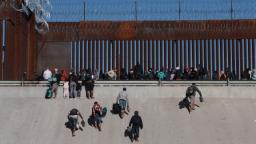Washington
CNN
—
The Biden administration will waive 26 laws to build additional border barriers in the Rio Grande Valley, according to a notice posted to the Federal Register Wednesday, citing “high illegal entry.”
Construction of the wall will be paid for using already appropriated funds earmarked specifically for physical border barriers, and the administration was under a deadline to use them. But the move comes at a time when a new surge of migrants is straining federal and local resources and placing heavy political pressure on the Biden administration to address a sprawling crisis.
Border Patrol reported nearly 300,000 encounters in the Rio Grande Valley sector between last October and August, according to federal data. Last month, Border Patrol apprehended more than 200,000 migrants crossing the US-Mexico border, the highest total this year.
President Joe Biden – who, as a candidate, vowed that there will “not be another foot” of border wall constructed on his watch – has been plagued by issues on the border since his first months in office, when the US faced a surge of unaccompanied migrant children that caught officials flatfooted. Over the last two years, his administration has continued to face fierce pushback from Republicans – and at times, Democrats – over his immigration policies.
But a new surge of migrants has placed additional pressure on federal resources and tested Biden’s latest border policies only months after going into place, prompting fresh criticism from Republicans and concern within the administration over a politically delicate issue.
Migration along the southern border has been a relentless focus of the Republican presidential primary field and conservative media, and leading Democrats, including the mayors of New York and Chicago, have begun publicly demanding stronger efforts by the federal government to provide resources to accommodate arrivals.
The Department of Homeland Security had concluded “it is necessary to waive certain laws, regulations, and other legal requirements in order to ensure the expeditious construction of barriers and roads” in Starr County, Texas, along the US border with Mexico, Homeland Security Secretary Alejandro Mayorkas said in the filing posted in the US Federal Registry.
“There is presently an acute and immediate need to construct physical barriers and roads in the vicinity of the border of the United States in order to prevent unlawful entries into the United States in the project areas,” Mayorkas said in the notice.
Construction of the wall will be paid for through a 2019 appropriations bill that funneled money specifically to a “border barrier” in the Rio Grande Valley, and according to Mayorkas, “DHS is required to use those funds for their appropriated purpose.” The funds needed to be spent by the end of fiscal year 2023, prompting the administration to choose to move forward this year with construction in south Texas, according to a source familiar.
US Customs and Border Protection had previously announced plans to design and construct up to 20 miles of new border barrier systems in Starr County, including light poles and lighting, gates, cameras and access roads, among other systems. CBP sought public input between August and September, according to the agency.
Among the laws the Biden administration is bypassing to build the wall are several of the same statutes the administration has in the past moved to protect, including: the National Environmental Policy Act, the Endangered Species Act, the Clean Water Act and the Clean Air Act.
A CBP spokesperson said the agency “remains committed to protecting the nation’s cultural and natural resources” while implementing “sound environmental practices” to build the border barriers.
Migrant crossings at the US-Mexico border are expected to remain high in the near term, a senior US Customs and Border Protection official recently told CNN, though additional commitments from Mexico are expected to help eventually drive down numbers.
This week, Mayorkas, Secretary of State Antony Blinken, Attorney General Merrick Garland and White House Homeland Security adviser Dr. Liz Sherwood-Randall will meet with their Mexican counterparts in Mexico City for annual security talks.
Migration is expected to be a topic of discussion. Senior administration officials maintain that the US has been in regular touch with Mexico over the situation at the US southern border, including commitments to shore up enforcement.
This story has been updated with additional information.


